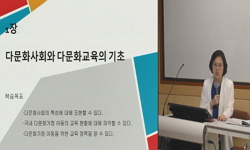배경 및 목적: 본 연구에서는 다문화 및 또래 일반아동의 정서행동 특성에 대한 부모와 교사의 보고가 일치하는지, 다문화 및 단일문화 아동 집단에서 부모와 교사의 보고 중 어떤 정서행동 ...
http://chineseinput.net/에서 pinyin(병음)방식으로 중국어를 변환할 수 있습니다.
변환된 중국어를 복사하여 사용하시면 됩니다.
- 中文 을 입력하시려면 zhongwen을 입력하시고 space를누르시면됩니다.
- 北京 을 입력하시려면 beijing을 입력하시고 space를 누르시면 됩니다.


한국 단일문화 및 다문화 아동의 정서행동 특성에 대한 부모 및 교사의 보고와 언어능력의 관계 = The Relationship between Emotional Behavior Characteristics Reported by Parents and Teachers and Language of Korean Mono-cultural and Culturally Diverse Children
한글로보기https://www.riss.kr/link?id=A106967930
- 저자
- 발행기관
- 학술지명
- 권호사항
-
발행연도
2020
-
작성언어
-
- 주제어
-
KDC
370
-
등재정보
KCI등재,SCOPUS,ESCI
-
자료형태
학술저널
- 발행기관 URL
-
수록면
227-241(15쪽)
-
KCI 피인용횟수
0
- 제공처
-
0
상세조회 -
0
다운로드
부가정보
국문 초록 (Abstract)
배경 및 목적: 본 연구에서는 다문화 및 또래 일반아동의 정서행동 특성에 대한 부모와 교사의 보고가 일치하는지, 다문화 및 단일문화 아동 집단에서 부모와 교사의 보고 중 어떤 정서행동 특성이 언어능력을 잘 설명하는지, 궁극적으로는 다문화 일반 아동 집단의 잔존하는 언어능력을 설명해주는 보호요인으로 정서행동 특성 중 강점(사회지향행동)이 언어능력을 유의하게 설명하는지 확인해보고자 하였다. 방법: 본 연구의 참여아동은 만 4-6세의 한국 단일문화 아동 18명과 다문화 아동 32명, 총 50명의 아동과 그들의 부모, 교사를 대상으로 하였다. 정서행동 특성은 한국어판 강점 난점 설문지를 사용하여 강점인 사회지향행동, 난점인 과잉행동, 정서증상, 행동문제, 또래문제를 측정하였다. 결과: 다문화 언어발달지연 아동의 경우 교사보다 부모가 아동의 난점을 더 높게 인식한 것을 제외하고, 각 집단 아동의 정서행동 특성에 대한 부모-교사의 보고는 일치하였다. 한국 단일문화 아동 집단은 교사의 또래문제 보고가 표현언어를 유의하게 설명해준 반면, 다문화 아동 집단은 부모의 과잉행동 보고가 수용언어를 유의하게 설명하여 차이를 보였다. 다문화 일반 아동 집단의 경우 부모의 사회지향행동 보고가 수용언어를 유의하게 설명하였다. 논의 및 결론: 다문화 아동 집단은 부모의 보고가 수용언어능력을 유의하게 설명하여 다문화 아동 집단에게서 부모보고의 중요성이 더욱 강조된다. 특히, 다문화 아동 중 정상적 언어발달을 경험하는 집단의 경우 부모가 보고한 아동의 사회지향행동의 발현이 언어능력에 유의한 기여할 수 있음을 확인하였다.
다국어 초록 (Multilingual Abstract)
Objectives: The purpose of this study was to investigate whether parents and teachers’ reports on emotional behavior characteristics of Korean mono-cultural and culturally diverse children are consistent. We tried to identify whether the strength (p...
Objectives: The purpose of this study was to investigate whether parents and teachers’ reports on emotional behavior characteristics of Korean mono-cultural and culturally diverse children are consistent. We tried to identify whether the strength (prosocial behavior) of emotional behavior characteristics significantly explains their language ability as a protective factor explaining the language ability of culturally diverse-typically developing children (D-TD). Methods: Participants were 18 Korean mono-cultural children (TD 11, LD 7) and 32 culturally diverse children (TD 16, LD 16) aged 4 to 6 years old, and their parents and teachers. Emotional behavior characteristics were measured using the Korean version of the Strength Difficulties Questionnaire (SDQ-Kr), which included the strength of pro-social behavior, and difficulties of hyperactivity, emotional symptoms, behavioral problems, and peer problems. Results: Parent-teacher reports on the emotional behavior of each group of children were consistent, with the exception that parents perceived their children’s difficulties higher than teachers in culturally diverse-language delay (D-LD) children. In the Korean mono-cultural children group, the teachers’ peer problem report explained the expressive language significantly; whereas in the culturally diverse children group, the parent’s hyperactivity report significantly explained the receptive language. In D-TD group, parent’s report of prosocial behavior explained receptive language significantly. Conclusion: The importance of parent reports was more significant in culturally diverse children as the parent’s report significantly explained the receptive language. In particular, in the case of D-TD group who had normal language ability, it was confirmed that children’s prosocial behavior reported by parents could contribute significantly to language ability.
참고문헌 (Reference)
1 이은주, "화용언어능력과 정서/행동문제와의 관련성- 초등학교 3학년 아동을 중심으로" 한국언어청각임상학회 24 (24): 906-924, 2019
2 안정숙, "한국어판 강점·난점 설문지(Strengths and Difficulties Questionnaire) 개발" 대한신경정신의학회 42 (42): 141-147, 2003
3 김홍규, "임상에서 부모-교사 보고의 일치 : SDQ-Kr과 K-CBCL의 비교" 대한소아청소년 정신의학회 23 (23): 127-133, 2012
4 임은주, "의사소통장애 아동의 문제행동에 영향을 미치는 요인" 한국언어청각임상학회 15 (15): 79-93, 2010
5 한지윤, "부모 보고형 아동 언어 능력 평가도구(KBPR)의 표준화를 위한 예비연구" 한국언어치료학회 27 (27): 69-84, 2018
6 김수진, "다문화가정 자녀의 차별경험과 언어문제가 심리사회적 적응에 미치는 영향: 자아탄력성과 가족건강성의 조절효과" 한국청소년학회 24 (24): 195-211, 2017
7 변순용, "다문화가정 아동의 도덕적 실태 분석과 다문화적 덕목의 필요성 - 다문화가정 아동의 사회・정서적 유능성을 중심으로 -" 한국윤리교육학회 (26) : 137-166, 2011
8 이승연, "다문화 가정 유아의 보호요인과 행동문제에 대한 부모와 교사의 평가 비교" 교육과학연구소 43 (43): 59-84, 2012
9 Becker, A. W, "Validation of the parent and teacher SDQ in a clinical sample" 13 (13): 11-16, 2004
10 Goodman, R, "The strengths and difficulties questionnaire : a research note" 38 (38): 581-586, 1997
1 이은주, "화용언어능력과 정서/행동문제와의 관련성- 초등학교 3학년 아동을 중심으로" 한국언어청각임상학회 24 (24): 906-924, 2019
2 안정숙, "한국어판 강점·난점 설문지(Strengths and Difficulties Questionnaire) 개발" 대한신경정신의학회 42 (42): 141-147, 2003
3 김홍규, "임상에서 부모-교사 보고의 일치 : SDQ-Kr과 K-CBCL의 비교" 대한소아청소년 정신의학회 23 (23): 127-133, 2012
4 임은주, "의사소통장애 아동의 문제행동에 영향을 미치는 요인" 한국언어청각임상학회 15 (15): 79-93, 2010
5 한지윤, "부모 보고형 아동 언어 능력 평가도구(KBPR)의 표준화를 위한 예비연구" 한국언어치료학회 27 (27): 69-84, 2018
6 김수진, "다문화가정 자녀의 차별경험과 언어문제가 심리사회적 적응에 미치는 영향: 자아탄력성과 가족건강성의 조절효과" 한국청소년학회 24 (24): 195-211, 2017
7 변순용, "다문화가정 아동의 도덕적 실태 분석과 다문화적 덕목의 필요성 - 다문화가정 아동의 사회・정서적 유능성을 중심으로 -" 한국윤리교육학회 (26) : 137-166, 2011
8 이승연, "다문화 가정 유아의 보호요인과 행동문제에 대한 부모와 교사의 평가 비교" 교육과학연구소 43 (43): 59-84, 2012
9 Becker, A. W, "Validation of the parent and teacher SDQ in a clinical sample" 13 (13): 11-16, 2004
10 Goodman, R, "The strengths and difficulties questionnaire : a research note" 38 (38): 581-586, 1997
11 Hart, K. I, "The relationship between social behavior and severity of language impairment" 47 (47): 647-662, 2004
12 Rose‐Krasnor, L, "The nature of social competence : a theoretical review" 6 (6): 111-135, 1997
13 Tomblin, J. B, "The association of reading disability, behavioral disorders, and language impairment among second-grade children" 41 (41): 473-482, 2000
14 Montroy, J. J, "Social skills and problem behaviors as mediators of the relationship between behavioral self-regulation and academic achievement" 29 (29): 298-309, 2014
15 Zadeh, Z. Y, "Social cognition and externalizing psychopathology : an investigation of the mediating role of language" 35 (35): 141-152, 2007
16 Lonigan, C. J, "Relations among emergent literacy skills, behavior problems, and social competence in preschool children from low-and middle-income backgrounds" 19 (19): 40-53, 1999
17 Kim, Y. T, "Receptive & expressive vocabulary test(REVT)" Seoul Community Rehabilitation Center 2009
18 Adams, J. W, "Problems of behaviour, reading and arithmetic : assessments of comorbidity using the Strengths and Difficulties Questionnaire" 69 (69): 571-585, 1999
19 Coolahan, K, "Preschool peer interactions and readiness to learn : Relationships between classroom peer play and learning behaviors and conduct" 92 (92): 458-465, 2000
20 Bulotsky-Shearer, R. J, "Preschool classroom behavioral context and school readiness outcomes for low-income children : a multilevel examination of child-and classroom-level influences" 104 (104): 421-438, 2012
21 Kim, Y. T, "Preschool Receptive-Expressive Language Scale (PRES)" Seoul Welfare Center for People with Disabilities 2003
22 Bagwell, C. L, "Preadolescent friendship and peer rejection as predictors of adult adjustment" 69 (69): 140-153, 1998
23 Ketelaars, M. P, "Pragmatic language impairment and associated behavioural problems" 45 (45): 204-214, 2010
24 Brinton, B, "Perspectives on individual differences affecting therapeutic change in communication disorders. New directions in communications disorders research" Psychology Press 7-27, 2010
25 Mitsis, E. M, "Parent–teacher concordance for DSM-IV attention-deficit/hyperactivity disorder in a clinic-referred sample" 39 (39): 308-313, 2000
26 Speltz, M. L, "Neuropsychological characteristics and test behaviors of boys with early onset conduct problems" 108 (108): 315-325, 1999
27 Achenbach, T. M, "Multicultural assessment of child and adolescent psychopathology with ASEBA and SDQ instruments : research findings, applications, and future directions" 49 (49): 251-275, 2008
28 Lindsay, G, "Longitudinal patterns of behaviour problems in children with specific speech and language difficulties : child and contextual factors" 77 (77): 811-828, 2007
29 Brinton, B, "Language, social skills, and socioemotional behavior" 24 (24): 194-198, 1993
30 Durkin, K, "Language, social behavior, and the quality of friendships in adolescents with and without a history of specific language impairment" 78 (78): 1441-1457, 2007
31 Moon, S. B, "Korean Kaufman assessment battery for children(K-ABC)" Hakjisa 2003
32 Bishop, D. V, "Identifying language impairment in children : combining language test scores with parental report" 44 (44): 600-615, 2009
33 Thijs, J, "Handbook on Positive Development of Minority Children and Youth" Springer 325-342, 2017
34 Hartup, W. W, "Handbook of social development: a lifespan perspective" Plenum Press 257-281, 1992
35 O’Kearney, R, "Emotional and behavioural outcome for children with early communication difficulties: evidence from the longitudinal study of Australian children (LSAC)" 60 (60): S166-, 2012
36 Fujiki, M, "Emotion regulation in children with specific language impairment" 33 (33): 102-111, 2002
37 Campbell, S. B, "Early externalizing behavior problems : toddlers and preschoolers at risk for later maladjustment" 12 (12): 467-488, 2000
38 Hughes, C, "Does executive function matter for preschoolers’ problem behaviors?" 36 (36): 1-14, 2008
39 Atzaba‐Poria, N, "Do risk factors for problem behaviour act in a cumulative manner? an examination of ethnic minority and majority children through an ecological perspective" 45 (45): 707-718, 2004
40 Sung, Y, "Differential effect of social-emotional behaviors on academic achievement of language-minority students" 43 (43): 393-416, 2014
41 Minke, K. M, "Congruence in parent-teacher relationships : the role of shared perceptions" 114 (114): 527-546, 2014
42 Goodman, R, "Comparing the strengths and difficulties questionnaire and the child behavior checklist : is small beautiful?" 27 (27): 17-24, 1999
43 Valiente, C, "Children’s effortful control and academic achievement : Mediation through social functioning" 22 (22): 411-433, 2011
44 Conti-Ramsden, G, "Adolescents with a history of specific language impairment(SLI) : strengths and difficulties in social, emotional and behavioral functioning" 34 (34): 4161-4169, 2013
45 St Clair, M. C, "A longitudinal study of behavioral, emotional and social difficulties in individuals with a history of specific language impairment(SLI)" 44 (44): 186-199, 2011
46 Choi, Y. J, "2018 National Multicultural Family Survey" Korean Women’s development institute 2019
동일학술지(권/호) 다른 논문
-
휴식상태 뇌기능자기공명영상을 활용한 파킨슨병 환자의 발성 관련 배쪽시상핵 기능연결성 분석
- 한국언어청각임상학회
- 김선우(Sun Woo Kim)
- 2020
- KCI등재,SCOPUS,ESCI
-
언어재활사의 언어표본분석 경험 및 요구에 관한 질적연구 : 후천성 신경언어장애를 중심으로
- 한국언어청각임상학회
- 윤지혜(Ji Hye Yoon)
- 2020
- KCI등재,SCOPUS,ESCI
-
- 한국언어청각임상학회
- 피민경(Minkyeong Pi)
- 2020
- KCI등재,SCOPUS,ESCI
-
언어재활사의 언어표본분석 경험 및 요구에 관한 질적 연구 : 아동언어장애를 중심으로
- 한국언어청각임상학회
- 오소정(So Jung Oh)
- 2020
- KCI등재,SCOPUS,ESCI
분석정보
인용정보 인용지수 설명보기
학술지 이력
| 연월일 | 이력구분 | 이력상세 | 등재구분 |
|---|---|---|---|
| 2018 | 평가예정 | 계속평가 신청대상(등재유지) | |
| 2015-01-01 | 평가 | 등재학술지 유지(등재유지) |  |
| 2013-03-29 | 학술지명변경 | 한글명 : Communication Sciences and Disorders</br>외국어명 : Communication Sciences and Disorders |  |
| 2012-12-18 | 학술지명변경 | 한글명 : 언어청각장애연구</br>외국어명 : Communication Sciences and Disorders |  |
| 2011-01-01 | 평가 | 등재학술지 유지(등재유지) |  |
| 2009-01-01 | 평가 | 등재학술지 유지(등재유지) |  |
| 2007-06-25 | 학술지명변경 | 한글명 : 언어청각장애연구</br>외국어명 : Korean Journal of Communication Disorders |  |
| 2007-01-01 | 평가 | 등재학술지 유지(등재유지) |  |
| 2006-09-13 | 학술지명변경 | 한글명 : 언어청각장애연구</br>외국어명 : Korean Journal of Communication Disorders |  |
| 2005-10-14 | 학술지명변경 | 한글명 : 언어청각장애연구</br>외국어명 : Korean Journal of Communication Disorders |  |
| 2004-01-01 | 평가 | 등재학술지 선정(등재후보2차) |  |
| 2003-01-01 | 평가 | 등재후보 1차 PASS(등재후보1차) |  |
| 2001-07-01 | 평가 | 등재후보학술지 선정(신규평가) |  |
학술지 인용정보
| 기준연도 | WOS-KCI 통합IF(2년) | KCIF(2년) | KCIF(3년) |
|---|---|---|---|
| 2016 | 1.13 | 1.13 | 1.17 |
| KCIF(4년) | KCIF(5년) | 중심성지수(3년) | 즉시성지수 |
| 1.21 | 1.18 | 1.626 | 0.33 |





 KCI
KCI 스콜라
스콜라






